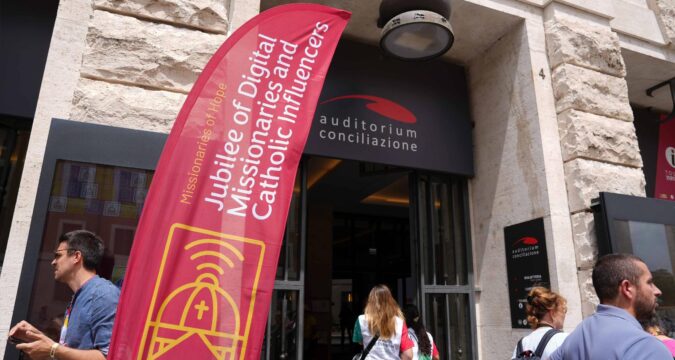
ROME (SE): Hundreds of Catholic digital missionaries and influencers from around the world gathered in Rome on July 28 and 29 for the first-ever Jubilee for Digital Missionaries and Influencers. The event, organised by the Dicastery for Evangelisation in collaboration with the Dicastery for Communication, was held as part of the wider Jubilee of Youth and aimed at deepening communion, fostering mission, and sharing hope through digital platforms.
Held at the Auditorium Conciliazione, the two-day celebration brought together men and women who evangelise in the digital sphere, offering them an opportunity to reflect, pray, and celebrate as one Church without borders.
In his opening remarks, Paolo Ruffini, Prefect of the Dicastery for Communication, welcomed participants and invited them to enter into a spirit of listening and genuine encounter. He reportedly noted the joy of meeting in person, while also emphasising that true connection does not stem from the Internet itself, but from something that transcends digital networks—namely, God.
Ruffini described the Church as a network of people rather than algorithms, one that has existed long before the Internet, formed not by content or code but by persons—diverse and imperfect—united by baptism and faith.
He urged digital evangelists to reject self-promotion and superficial communication, and to root their online mission in humility and prayer.
[Ruffini] urged digital evangelists to reject self-promotion and superficial communication, and to root their online mission in humility and prayer
Quoting the late Pope Francis, he invited participants to consider challenging but essential questions: how to sow hope in times of despair, how to heal division, and whether their communication remains grounded in spiritual depth or has drifted toward marketing language. He encouraged attendees to resist being swept away by the tides of digital culture and instead to “cast the net on the other side.”
Pietro Cardinal Parolin, Vatican secretary of state, also addressed the gathering. He appealed to participants to remain “connected to hope,” especially in an era marked by misinformation, division, and social isolation. He said that digital missionaries are called to offer something distinct—the light of Christ.
Cardinal Parolin was reported to have reminded participants that they are more than content creators or platform builders; they are witnesses and bridge-builders. He emphasised that Christian presence online should be defined by truth, charity, and humility, and that even a short post, if shared in faith and love, can become “a spark of grace.”
He encouraged digital missionaries to remain firmly rooted in prayer, Scripture, and the sacraments.
The programme also included reflections from Jesuit priests, Father David McCallum and Father Antonio Spadaro, who explored how the Church might respond to a digital culture shaped by algorithms and rapid communication, using the enduring wisdom of the gospel.
Workshops addressed the practical challenges and opportunities of digital evangelisation, while moments of prayer, Eucharistic adoration, and the Sacrament of Reconciliation helped build a sense of communion beyond the screen. Óscar Cardinal Rodríguez Maradiaga and José Cardinal Cobo Cano were among those who led spiritual activities, and the Taizé Community animated a prayer vigil.
Workshops addressed the practical challenges and opportunities of digital evangelisation, while moments of prayer, Eucharistic adoration, and the Sacrament of Reconciliation helped build a sense of communion beyond the screen
On July 29, participants were scheduled to walk in pilgrimage to St. Peter’s Basilica, pass through the Holy Door, and attend a Eucharistic celebration presided over by Luis Antonio Cardinal Tagle. Later in the day, during a visit to the Vatican Gardens, they were expected to consecrate their mission to the Blessed Virgin Mary, who was referred to by Ruffini as “God’s first influencer.” This act symbolised the desire to root their digital work in humility, discernment, and love.
The Jubilee concluded with a festival of music and personal testimonies in Piazza Risorgimento. The closing celebration aimed to express the joy of diversity, unity, and mission — of sharing hope with a world in search of meaning.
Throughout the event, Vatican News provided live, multilingual coverage, supported by the Vatican Vox app and Vatican Radio, enabling those unable to attend in person to take part virtually.
Ruffini reminded those gathered that they were not alone, but part of a single people. He added that the ultimate mission of Catholic digital influencers is not merely to connect the world, but to make it truly human and truly Christian.








